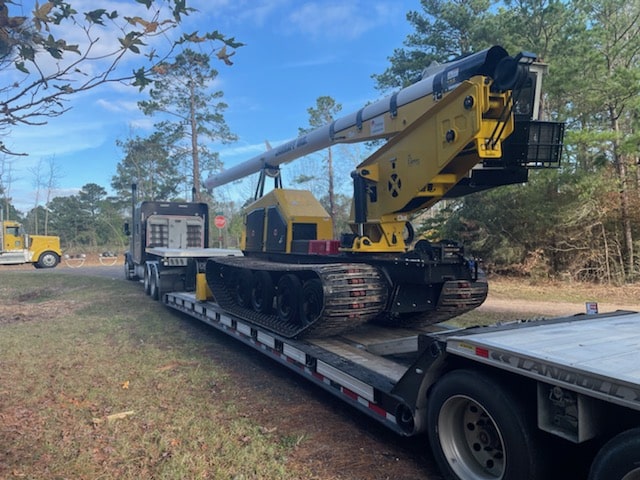Safety Tips for A Successful Heavy Equipment Transport Process

William Thomas / January 2021
Safety and Security are two paramount considerations for heavy equipment transport industry. A truck hauling over 40 tons of super load poses a significant safety implication to the driver, other motorists, and people operating near roadways. Because truck safety supersedes other towing and delivery processes, heavy equipment transport experts should maintain the highest level of safety standards at all times. The following are guidelines for the safe loading, transport, delivery, and unloading of heavy cargo;
Top Safety Tips Guidelines Before Loading Heavy Equipment
As we look in ways to improve heavy equipment shipping experiences to customers and the transport crew, safety concerns remain the number one priority. Loading sites are high-risk areas, and any measures put in place to bolster safety will save lives and properties.
Just like most pickup locations, loading docks are a beehive of material handling and lifting of heavy equipment. A large number of activities running simultaneously in the docks present a variety of safety issues. Truck drivers and operators need to be extra keen and careful about what they are doing and as well as being cautious of what others are doing particularly those that are using cranes, forklifts and other heavy equipment lifting equipment. Whether preparing to load heavy equipment from the docks or offsite, following these tips will keep everyone safe.
- · Ensure that the logistic team has mapped all the most convenient transport route and roads.
- · Ensure you have the right equipment; from the towing tractor, the trailer, to the handling equipment.
- · Conduct a visual inspection to ensure that there is no physical damage to any of the equipment; brakes are working, tires are optimally inflated, etc.
- · Before loading, confirm all paperwork is completed, and any necessary permits are acquired.
- · Ensure all the safety gear is available.
- · Prepare the site for loading; ensure there is enough space for ramps, the ground is flat and hand enough to bear the weight of loaded trailer and obstacles are cleared.
- · Inspect the securement systems for any points of damages.
- · Ensure all the loading guidelines are in place before actual loading of the heavy equipment.

Transport Your Heavy Equipment Today
Heavy Equipment Transport is always available for a quote. Fill out the form or give us a call now! (888) 730-2951
Safety Tips to Observe During Loading of Heavy Equipment
Due to the abnormal weights, sizes, and shapes of oversize loads transports, special attention needs to be observed while loading the trailer. Forklift operators, spotters, drivers, and everyone else working at the loading area risk getting injured if a single person fails to observe safety measures.
Every loading task is unique, and although there is no one-size-fits-all solution, following the already established safety guidelines will keep everyone safe and enhance a smooth trucking and delivery process. Below are just a few of the safety guidelines that everyone needs to adhere to;
- · Ensure all non-essential personnel are at a safe distance.
- · Only trained and qualified personnel should handle the loading process.
- · Ensure the load is well balanced and evenly distributed across the carrier. The center of gravity should also be lowest.
- · Ensure that equipment load securement protocol and guidelines are properly followed.
- · Ensure all the safety indicators are in place; the yellow rotating light, flag, and banner with the correct color and markings.
- · Before leaving the pickup point, counter check to ensure you have all the permits. Also, go round the trailer and inspect all tie-downs, the position of the load, and availability of tarp and tarp system, if any.
Safety precautions to Observe While Transporting on Roads and Major Highways
Highway trucking challenges even the most experienced truck drivers. Increased number of motorists, narrowed and shifting speeds, and ongoing road constructions are a few set of challenges that motorists face every time they hit the road.
Drivers towing heavy equipment bear the greatest responsibilities while trucking across interstate highways. This is so since a truck moving a 70-ton oversize that is 8.5 ft. bears the greatest safety concerns. So, when a driver is delivering heavy equipment through the highways, it’s prudent to observe the following safety tips.
- · Conduct visual inspections at regular intervals.
- · Drivers should always wear seatbelts all the time.
- · At no time should drivers use cellphones or any other handheld device.
- · Drivers should always drive within the speed limit.
- · Drugs and alcohol impair judgment, drivers should only drive when sober. Other equipment operators should also work when free from drugs and alcohol.
- · Drivers should always maintain a safe space cushion on all sides to prevent collisions while trucking.
- · Drivers should observe proper braking distance and slow down accordingly when switching lanes or making turns.
- · Drivers should not operate a truck while exhausted. They should eat healthily and take enough rests as required.
- · Drivers should be keen on weather changes and avoid driving in extreme weather conditions.
Safety Tips While Unloading Heavy Equipment After Delivery
After a long haul, the driver and machine operators are usually tired. Since they probably have years of experience in unloading heavy equipment, it’s easy not to pay close attention to all safe unloading guidelines. From previous statistics, it has been established that most accidents that happen during loading and unloading are caused by sheer negligence. Getting trapped between machines, falling while driving down the ramp, or being catapult while operating the securement systems are the most common accidents that occur at the pickup and drop-off locations. All this can be avoided if:
- · Unloading heavy equipment from the truck is done by at least two people
- · A spotter should always guide an equipment operator when unloading a heavy cargo
- · The truck, the trailer, securement assemblies, and other equipment should be inspected before unloading the oversize road.
- · The truck should be parked in a clear site and away from water, power, and gas lines.
- · Always choke the wheels and set the trailer brakes on before unloading and adhere to all other safety guidelines

William Thomas
Heavy Transport Specialist
Being able to lead a team of such talented logistics agents has been a wonderful experience over the past ten years. If you would like to know anything more about the heavy equipment transport services we offer, don't hesitate to give us a call!